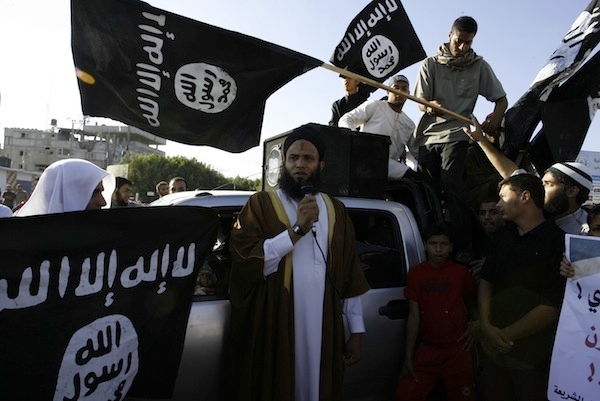The drawback to waging a global counter-terrorism campaign is that, just when you think you have one bunch of Islamist militants on the run, another one pops up to take its place. For all the breakthroughs chalked up by those prosecuting the war against al-Qa’eda, the movement has re-emerged in new guises in Somalia and Yemen. The murderous riots in Libya last week, ostensibly triggered by a homemade American video, were being quickly traced back to what may be the latest and safest home for al-Qa’eda: northern Mali.
Those who hoped the war on terror was about to end in Afghanistan have not wanted to think about Mali. But it is growing harder to ignore the fact that al-Qa’eda in the Islamic Maghreb now runs a chunk of territory three times larger than Britain. For most in the intelligence community, the establishment of this desert kingdom is on a par with Osama bin Laden’s decision to move to southern Afghanistan in the late 1990s.
The moment the jihadis started flying their black flags in Timbuktu, al-Qa’eda was transformed from a terrorist group into a de facto Islamic republic. By way of announcing their arrival, the masters of this new fiefdom promptly arranged for the public stoning to death of a couple who were accused of having children outside marriage. The interim president of Mali, Dioncounda Traoré, is overwhelmed and has called for outside military assistance to expel the jihadi menace. François Hollande, the new French president, has urged African countries to come to the aid of its former colony. But from everyone else in the West, there has been almost total silence.
Since its inception, the al-Qa’eda movement has sought to seize control of an entire country to have the facets of governmental infrastructure at their disposal. They have this in Mali: a sprawling network of airports, military bases, arms dumps and training camps. The potentially devastating consequences of al-Qa’eda’s Malian takeover have been noted by the MI6 and the CIA, but what the West intends to do is another matter.
For the past decade, every time al-Qa’eda has been looking for a new home it has found the American military in pursuit. In Yemen a brilliantly executed US drone strike killed Anwar al-Awlaki, the American-born terrorist mastermind behind the infamous underwear bomb plot at Detroit airport at Christmas 2009. This has debilitated the terror cell he founded. Even al-Shabab militants in Somalia now find themselves driven from their stronghold in Mogadishu and are under pressure from the new democratically elected government to mend their Islamist ways.
All this had vindicated what David Petraeus, the CIA director, calls his ‘whack-a-mole’ policy: hitting all the disparate terror cells at once rather than allowing new groups to appear. As Petraeus told me shortly before taking up his post at Langley last year, it was no good hitting a group in Pakistan if another group appeared in East Africa or Yemen. ‘You have to hit all the moles at once, and for that you need an effective network,’ he declared.
But the unwelcome appearance of the Malian ‘mole’ on the counter-terrorism landscape has come at a time when the western alliance is a lot less cohesive. This is partly explained by Barack Obama’s fear of messy and complicated overseas conflicts. Having withdrawn American forces from Iraq and committed the Pentagon to undertaking a similar drawdown from Afghanistan by the end of 2014, the President has no appetite for further military entanglements, no matter how grave the threat.
On issues such as Iran, Libya and Syria, the default position of the White House is to steer clear at all costs. In London, David Cameron and his allies make out that last year’s military intervention in Libya was an unmitigated success. But privately they recognise they had a lucky escape, and that the outcome might have been very different had Colonel Gaddafi not been such a soft target. This helps explain the absence of any appetite for a Libya-style intervention in Syria, even though the Assad regime’s barbaric assault on the Syrian people far exceeds anything Gaddafi achieved in Benghazi.
Word among senior British military officers is that, if it becomes necessary to neutralise the Mali threat, it will be left to our much-vaunted and overworked special forces to take the action required. Britain would not deploy a large combat element of the kind dispatched to Sierra Leone in 2000. As units of the Special Boat Squadron discovered last March, there are no guarantees of success when dealing with Islamist fanatics who think nothing of sacrificing their lives for the al-Qa’eda cause. The SBS were sent to rescue the British hostage Chris McManus, who had been captured by a Nigerian al-Qa’eda cell which had close ties with like-minded terror groups in Mali. He was killed in a gun battle.
Bin Laden came to the world’s attention during the boom years — but his African successors are striking at a time when defence budgets are being eviscerated throughout the Nato alliance. The French approach is immeasurably more proactive than anything you will hear in London or Washington. This approach might suit the bean-counters who now preside over our defence strategy, but it is unlikely to make the world a safer place.






Comments